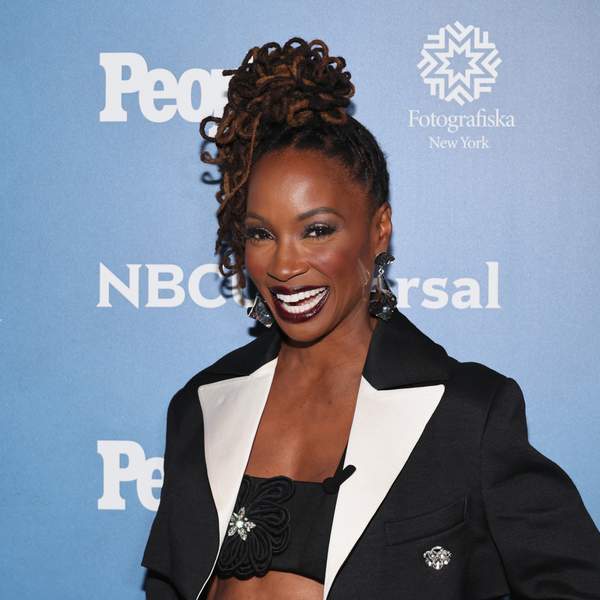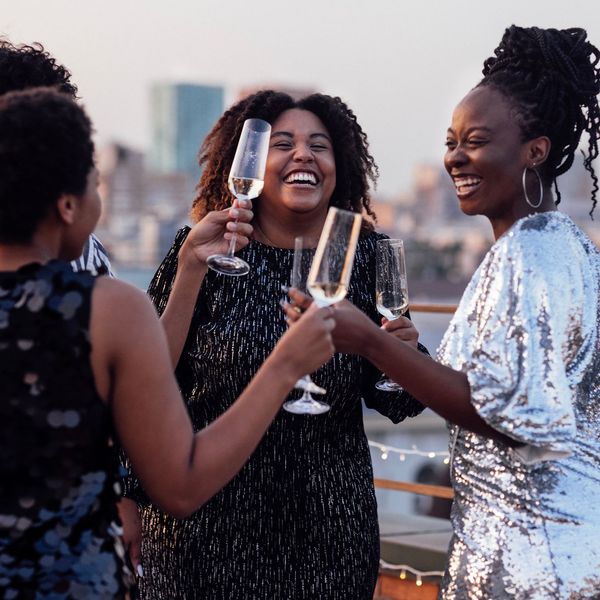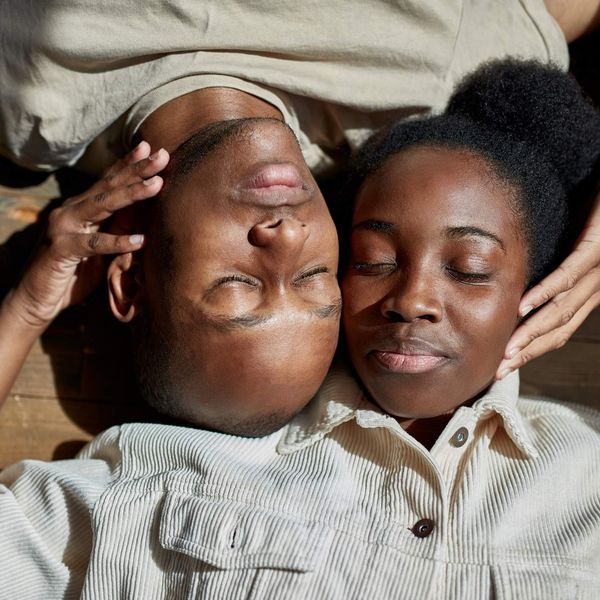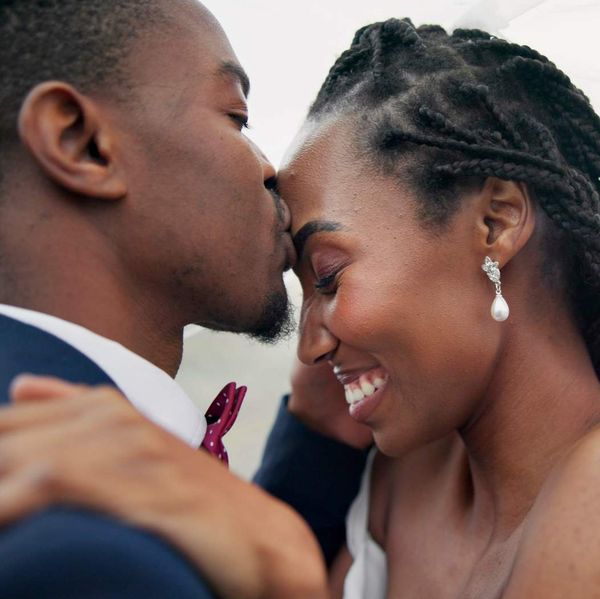A few weeks ago, a girlfriend asked me to name a female celebrity who I personally found to be physically beautiful. Although it took me a second to run through my mental Rolodex, two people who came to my mind were actors Javicia Leslie (who I first “stumbled upon” via the series Chef Julian) and Shanola Hampton.
As far as Shanola goes, I was first introduced to her via the independent film Things Never Said (which also starredOmari Hardwick). Anyway, it’s always so cool to watch people evolve in their respective fields and Shanola has definitely become a household name thanks to the role that she currently plays in the NBC series Found.
And y’all, my fondness for her certainly went up a few notches after I peeped a few things that she recently shared in a PEOPLE interview. In 2025, she will have been married to her beloved for 25 years (salute!). As she was talking about their wedding day, she shared that they eloped in Las Vegas, that it only cost them $532, that she wore a thrift store dress and “Erykah Badu headwrap” and that she only has one regret.
Because they were “too broke” at the time to afford a full elopement package, they didn’t get a videotape of her nuptials (they do have pics, though). She also said that a big part of the reason for the regret is because she adored her husband, Daren’s vows: “Gosh, if we could only have seen what it was going to be...” INDEED.
As a marriage life coach, something else that I appreciated about the article is when she said, “Yes, you learn and grow and evolve. But you don't change each other by marrying each other." Lawd, if more people really got that, less folks would end up in divorce court (check out “The Right Relationship IMPROVES Not CHANGES You”).
However, the main reason why I’m using Shanola’s words of wisdom as the intro for this piece is because I know far too many couples who either keep putting off wedding plans to save thousands of dollars for a ceremony or they are far too stressed out because they think a big wedding is something that absolutely must be done.
Well, between what you just read and what you’re about to read, here’s hoping that you’ll realize (and accept) that there are all kinds of benefits that come from taking the “less is more” approach — yes, even when it comes to wedding days.
First, the Difference Between a Micro-Wedding and Eloping
 Giphy
GiphyI promise you that I don’t get why so many folks damn near hyperventilate whenever they hear “small wedding” (or micro-wedding which is apparently the popular term right through here). It’s like they are automatically wired to think that means making some wack concessions or that they automatically have to elope. Well, before getting into some actual facts that come from taking the minimalist approach to one’s nuptials, let me just say that just because you don’t end up having 500 people on your wedding guest list or three choices of cuisine at your reception, that doesn’t mean that you have to end up at the courthouse in a pair of sweats.
For one thing, treat yourself to TikTok and put “Black elopements” in the search field. Yes, even if you do elope, you can still dress to the nines (or 12s because you don’t have to spend as much money as you would on a wedding), it can be at another location (like a beach or even a church) and then you have the rest of the day to do whatever you want: post up in a swanky hotel, fly some place that requires a passport stamp for your honeymoon — whatever. And, since you’re eloping, you and your bae can be totally off the grid the entire time.
However, a micro-wedding is a bit different. Basically, it’s what happens when you do pretty much everything that you wanted to do for your wedding only, it’s with a guest list of 50 people or less. And I’m pretty sure you can see the immediate benefit that comes with taking that approach: you’re able to save money — and y’all, since reportedly a whopping 56 percent of couples went into debt just from their wedding alone and financial issues continue to be a leading cause of divorce, well, yeah, don’t diss a micro-wedding. It definitely has its perks.
Okay, but there are other researched and fact-based reasons why it can be a wise move to go smaller as far as weddings are concerned. Here are just six of ‘em.
1. Expensive Rings (Oftentimes) Predict Shorter Marriages
 Giphy
GiphySome of y’all may remember the student last year who went viral on TikTok and then became a news story thanks to his under-twenty-bucks device that let teachers at his school know if their engagement/wedding ring was the real deal or not (chile). Hmph, all it did was remind me of the De Beers origin story of engagement rings and how I will continue to share it until each and every cow comes home. Basically, the company was going broke, it came up with the slogan “a diamond is forever” and folks have been drinking the Kool-Aid ever since. SMDH. And what’s really wild is while people actually think that saving up three months of a salary is a sign of one’s everlasting love, there are articles out in cyberspace with titles like “Why an Expensive Ring May Predict a Short Marriage.”
In this one, it features a study that said the people who spend somewhere between $2,000-$,4,000 have a higher chance of divorcing. The reason? Eh, I’d venture to say that it’s probably not so much about the ring itself but the motive behind why someone wants a really expensive one, how realistic their expectations are about marriage and their financial future, and if they want to be a wife or just a bride — and yes, there is a really big difference, chile (check out “Do You Want To Be A Wife? Or Do You Just Want To Have A Wedding?”). Not to mention the stress that the groom-to-be may have experienced to make the sacrifice (especially if it was above his means). Either way, take note.
2. Smaller Weddings Can Be Exquisitely Intimate
 Giphy
GiphyI have a little love sister who has been engaged for over three years now. Y’all, it can’t be said enough that the purpose of being engaged is to plan your wedding — literally that is what the time is for. Know what else needs to be reiterated? The fact that some studies say that the longer you’re engaged, the more likely you are to divorce. One study gets even more specific than that. It says that if you’ve been engaged for more than 27 months, the intimacy between you and your partner will suffer during its newlywed years and yes, it could lead to a serious breakdown in the relationship.
That’s why I’ve been telling her that instead of her and her fiancé damn near killing themselves to pay for an over-the-top wedding, they can have a smaller one — one that is more intimate and can be just as beautiful. If you don’t believe me, check out Brides' “40 Small Wedding Ideas for an Intimate Affair” piece. Personally, I’ve always liked the idea of renting out a really nice vacation house and having loved ones all stay together while getting married at the same location.
Sometimes big weddings are so big that a lot of the “closeness” is lost and certain moments are a complete blur. With a smaller wedding, the chances of these things transpiring end up dropping…significantly so.
3. The Planning Process Is Far Less Stressful
 Giphy
GiphyI’m telling you, when it comes to this topic, the facts just keep on coming. Boy, there is nothing like working with an engaged couple while they are planning their wedding — if that doesn’t reveal some things about what their relationship is actually made of, nothing will. Hey, but you don’t have to take my word for it.
A few years back, Business Insider published an article entitled, “Wedding planners reveal the 10 biggest red flags that a couple won't make it.” One of the things that it said was, “From unrealistic budgets to family conflicts, there are multiple problems that can arise during the wedding-planning process that can create rifts in a marriage or even lead to divorce.”
Yeah, they ain’t neva lied because if you don’t know how to keep your emotions in check, how to negotiate, how to set boundaries with family members and friends (bookmark that one), and how to compartmentalize your wedding with the rest of your relationship — you shouldn’t ignore that; it’s actually showing you something about your dynamic that you should address prior to jumping any broom.
Anyway, the main moral to the story when it comes to this one is if your wedding is small(er), there is less to plan…and if there is less stress, then your relationship won’t end up having to endure so much pressure. #justsaying
4. Less Folks? Less People to Please.
 Giphy
GiphyAh yes, the bookmark. Listen, if you are a bona fide people-pleaser (check out “How To Stop Being A People-Pleaser & Start Doing You”), the wedding planning process is going to test you in ways that you’ve never been tested before! This will especially be the case if you have some pretty poor boundaries with your loved ones (and/or perhaps his) to begin with. It’s another message for another time that you really need to involve people in the planning process who know that it’s you and your fiancé’s day (NOT JUST YOURS), that they should just be supportive and encouraging (not demanding and entitled) and it only needs to consist of who will make it be about your needs over their wishes.
For now, I’ll just say that when your wedding and guest list are smaller, there are far less people to, well, please. And again, if you are a people-pleaser (or a people-pleaser in recovery) that can really take a load off.
5. Cheaper Weddings Lead to Happier Marriages. Science Says So.
 Giphy
GiphySo, about a decade ago, CNN published the article, “Want a happy marriage? Have a big, cheap wedding.” The gist of it simply stated that “a new study found that couples who spend less on their wedding tend to have longer-lasting marriages than those who splurge.” The first thing that comes to my mind on this one is simply, that some people marry people and others “marry” weddings. Now does this mean that every couple who has an opulent wedding day is shallow and superficial or that they are getting married for the wrong reasons? Of course not. For one thing, some folks can afford to have an expensive wedding (meaning, it won’t put them into debt to have one).
Plus, having extravagant taste doesn’t mean that someone’s love isn’t real. AT THE SAME TIME, THOUGH, having a big wedding thinking that it proves something? It really proves nothing as far as the foundation of a healthy marriage is concerned. Yeah, my biggest takeaway from this point is when you just want to start the “becoming one” process with the man who you love, the price tag really doesn’t matter. They way it should be.
6. Finances Can Go Elsewhere
 Giphy
GiphyLast year, CNBC published the article, “Gen Z, millennial couples say it’s too expensive to get married in this economy.” Boy, and if this doesn’t prove the ultimate point that I’ve been trying to make this entire time, nothing will. Y’all, when you really want to be with your “one”, who cares about how beaded a dress is, how expensive a venue should be or how tall a cake looks — and so, why should you wait damn near forever until you can pay for all of those things? A party is nothing compared to a lifetime partner. That said, STAY FOCUSED.
Besides, all of those thousands that you saved by not having a big wedding can go to things like a downpayment on a house, a really long international honeymoon, a new car, a savings account for your future children, a retirement account — the possibilities really are endless and all of them can help your marriage to have a more solid footing.
____
So, if you initially read the title of this and low-key got cynical, maybe now you get just how “onto something” Shanola and her husband — again of almost 25 years — actually were. Smaller, less expensive weddings can be absolutely priceless. For all sorts of reasons. As you just read.
Again, salute to them and, if you are (currently) engaged, wise wedding planning wishes to you.
Let’s make things inbox official! Sign up for the xoNecole newsletter for love, wellness, career, and exclusive content delivered straight to your inbox.
Featured image by Dia Dipasupil/Getty Images




















